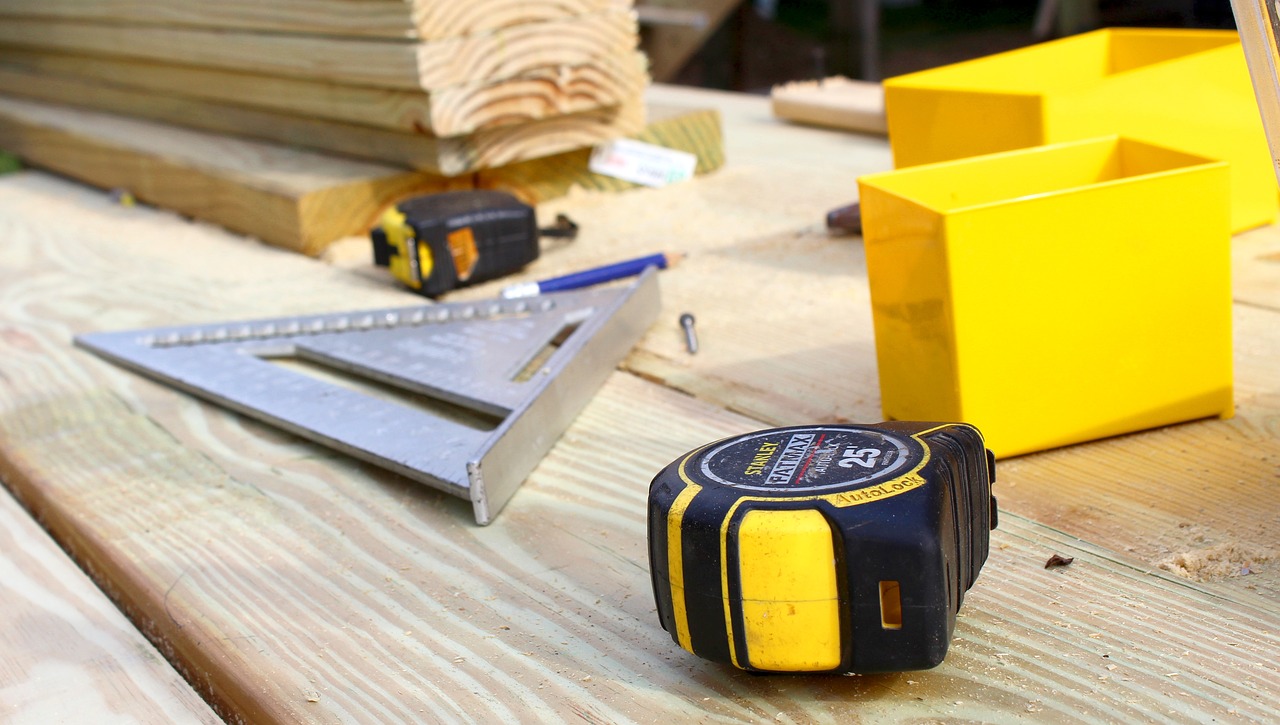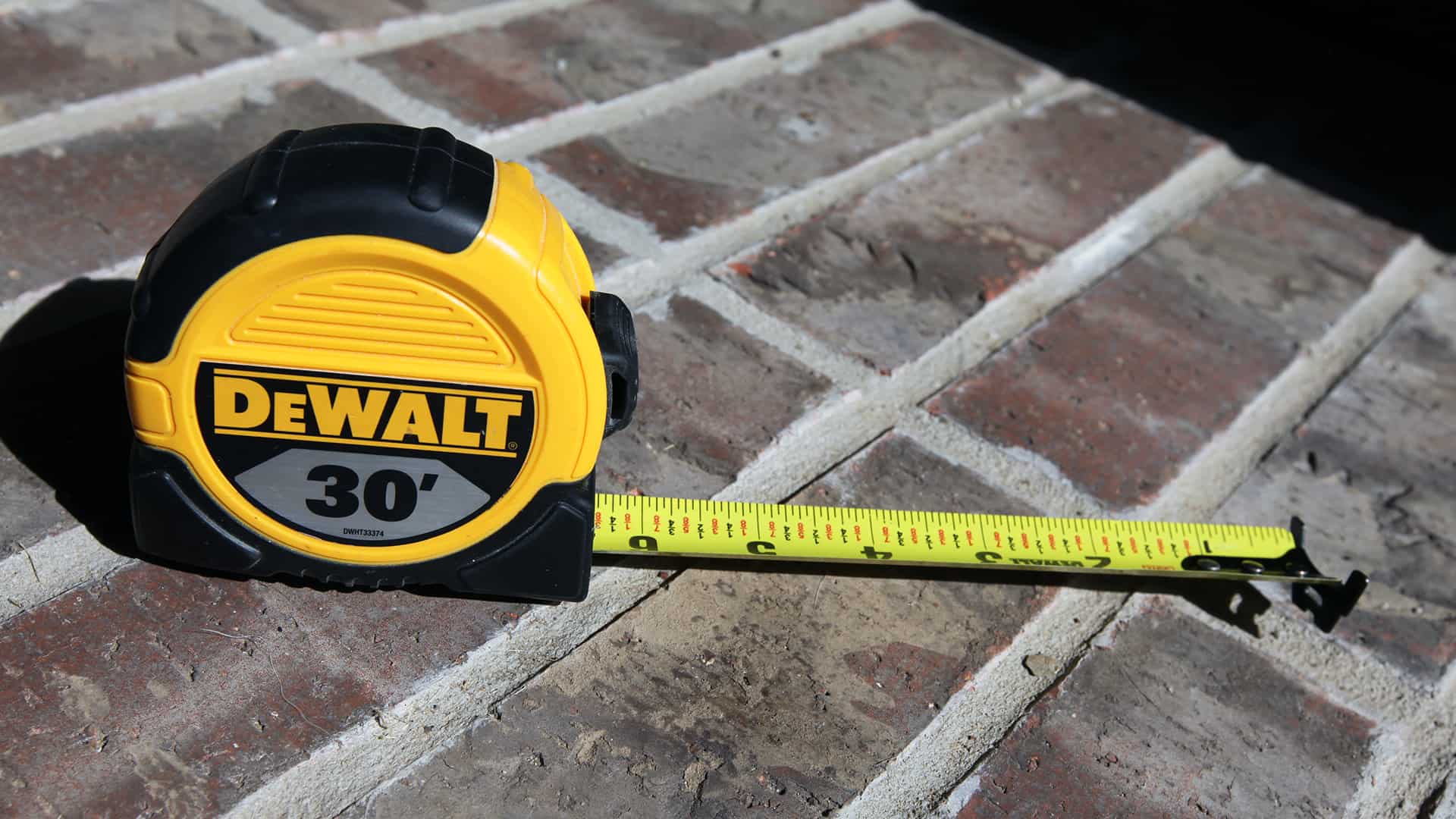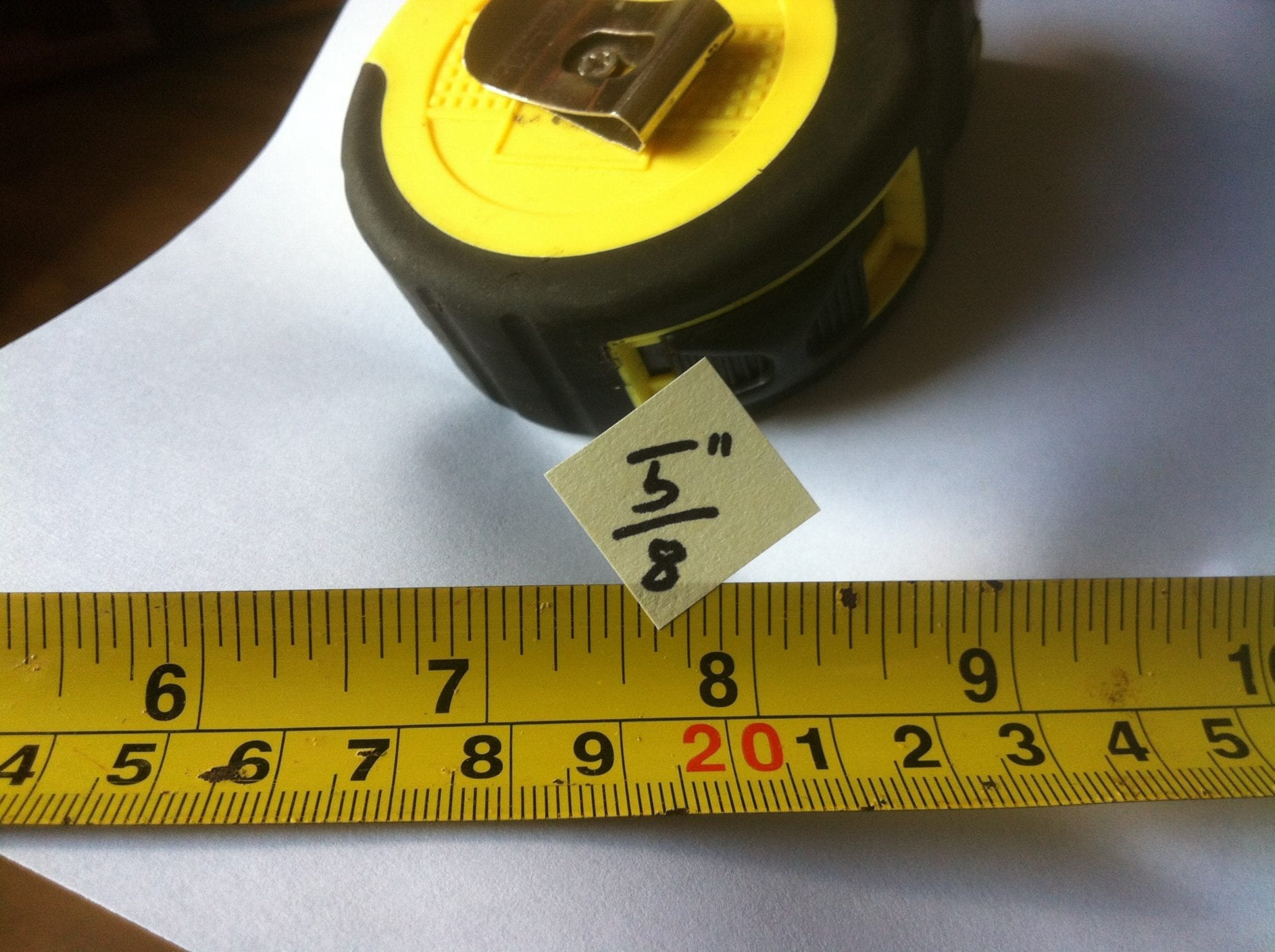Tape measures are often designed for specific uses or trades. Tapes may have different scales, be made of different materials, and be of different lengths depending on the intended use. Tape measures that were intended for use in tailoring or dressmaking were made from flexible cloth or plastic. These types of tape measures were mainly used for the measuring of the subject's waist line.
Today, measuring tapes made for sewing are made of fiberglass, which does not tear or stretch as easily. This type of tape measure will have a floating tang or hook on the end to aid measuring. A tape measure of 25 or even 100 feet can wind into a relatively small container. The self-marking tape measure allows the user an accurate one hand measure. Most standard tape measures in the U.S. have markings that measure down to 1/16 of an inch.
These are smaller, sometimes thinner markings, evenly spaced between the half-inch and inch marks on a tape measure. On some tapes, quarter inch marks are the same size as eighth-inch marks. Remember that two sixteenths of an inch equals one eighth, two eighths of an inch equals one quarter, and 2 quarters equals one half. For example, the second eighth-inch marking after the inch marking is a quarter inch. Reading a tape measure correctly is a necessary skill when taking on DIY projects. Tape measures are available in both standard or imperial units and in metric units.
This guide will show you how to read a tape measure. Plus, you'll learn some tips and tricks for using this tool to get precise measurements. No matter which measurement system your measuring tape follows, the basic anatomy of the tool and how to read it remain the same. For most measurements, find the inch marking and then count your hashes till you get to your fraction of an inch.
Some tape measures also have a simple way to show your measurement in feet and inches. Those are helpful if you don't want to start dividing your inch measurements by 12 all the time. A tape measure, or measuring tape is a type of hand tool typically used to measure distance or size. It is like a much longer flexible ruler consisting of a case, thumb lock, blade/tape, hook, and sometimes a belt clip.
A tape measure will have imperial readings, metric readings or both. They are a common measuring tool used in both professional trades and simply around the home. Just as you would with a retractable tape measure, look for the spot where the end of the object or distance you're measuring lines up with the tape measure. If the tape measure stretches exactly halfway between the 27 and 28 inch markings, this means that your arm is 27.5 inches long.
Markings that are smaller than quarter inch symbols indicate one-eighth inch markings. Usually, they occur between an inch's symbols as well as between the quarter inch mark and the half-inch mark. In addition, these markings repeat along a tape measure or ruler.
The most common tape measures are 12 feet, 25 feet, or 100 feet in length. A 12-foot tape measure is the handiest for consumers. The 25-foot length is called a builder's tape and is marked in feet and at 16-inch increments to make measuring the standard distance between wall studs easier. The 100-foot tape, usually of reinforced cloth, is useful for determining property boundaries and other exterior measurements. When I started to sew and for a long time afterwards I just knew the main marks in the tape measure.
Something as basic as this should be taught in the school rather than some other nonsense that I learned in school, which I never found a use afterwards. In this age of laser measuring tapes , electronic tape measures and measuring tape apps , and easy paper patterns one may wonder at the use of the ordinary tape measures. But for me it is one of the most useful and necessary sewing tool. A tape measure is a portable measurement device used to quantify the size of an object or the distance between objects. The tape is marked along the tape edge in inches and fractional inches, typically in quarter-, eight-, sixteenth-inch increments.
Some tape measures are marked in millimeters, centimeters, and meters on one edge. But if you DO end up needing or using a metric tape measure, know that for every meter, there are 100 cm and for every cm, there are 10 mm. Most metric measuring tapes only mark the cm for readability, so you'll need to count the number of ticks in between to get your exact measurement. Sometimes, there are larger ticks in between each cm to denote 1/2 cm.
A 16-foot tape measure, for example, will have sixteen one-foot marks along its length and 192 one-inch marks . Each inch will have eight 1/8 inch marks and sixteen 1/16 inch marks. In many cases these measurements are abbreviated, so 6 ′ 4 1/4 ″ means six feet four and a quarter inches. You will see a foot designation marked every 12 inches . Reading a tape measure is a skill you can easily master.
Using this small, sturdy hand tool can improve the accuracy of your project measurements. Learning how to use a tape measure properly means to always "measure twice, cut once." You can use a standard tape measure or opt for a metric one. Get measuring tapes and other measuring tools. The Home Depot delivers online orders when and where you need them. The sale of dual Metric/US Customary scale measuring tapes is slowly becoming common in the United States. For example, in some Walmarts there are Hyper Tough brand tapes available in both US customary units and Metric units.
So, the inclusion of a metric scale requires the measuring device either to contain 3 scales of measurement or the elimination of one of the US Customary scales. Sixteenth-inch marks are considered as the shortest lines of all measuring tapes. You will find 16 tiny marks per inches and 4 in each quarter inch. To read a measuring tape, line the zero mark up at the edge of the item you're measuring, then stretch the tape all the way across the item. Try to keep the tape straight to ensure an accurate measurement!
Then, look at the point where the tape meets the end of the item you're measuring and read the nearest large number. The large numbers are the units you're measuring, like inches or centimeters, and the markings between the large numbers correspond to fractions of that unit. The use of millimeter only tape measures for housing construction is a part of the US metric building code. This code does not permit the use of centimeters. Millimeters produce whole numbers, reduce arithmetic errors, thus decreasing wastage due to such errors. Personally I much prefer this type of measuring tapes for sewing.
Converting lengths for sewing is simple using a tailor's tape marked in both cm and inch. All you need to do is read the inch side corresponding to the number in centimeters. If we have to convert for example 66 cm into inches, looking at the image below we can see the result is 26 inches. On a tape measure labeled with imperial units, the most prominent marks are usually the one-inch marks. These are typically marked by long, thin lines and fairly large numbers. For tapes with no inch or centimeter labels or markings, use the increments of an inch or centimeter to determine the measurement.
However, you might need to add respective fractions when adjusting to how to read a ruler in inches. In metric measuring tapes, centimeters are the most significant markings. Centimeters are generally represented by the large lines , and you will see a number next to each line. Same as inches, the line represents each centimeter. A tape measure or measuring tape is a flexible ruler used to measure size or distance.
It consists of a ribbon of cloth, plastic, fiberglass, or metal strip with linear measurement markings. Its design allows for a measure of great length to be easily carried in a pocket or toolkit and permits one to measure around curves or corners. The trick to reading standard tapes is learning to recognize the markings from largest to smallest. Most standard tapes have a special mark, such as an arrow, at each foot. Half-inch marks are the next longest, followed by 1/4-inch, 1/8-inch and 1/16-inch.
Some tapes have 1/32-inch marks, but these can be tedious to read. In the United States, the imperial measurement system is normally used on a tape measure, though some models may have both the imperial and the metric system. To draw a straight line, hook the tab onto a straight ledge of a board or a table ledge and extend the tape.
Place the pencil at the desired length and let the tape housing come up to meet the pencil, then lock the tape in place. Holding the pencil and tape housing with one hand, place your other hand on the hooked tab, dragging the tape measure, pencil, and hooked tab down the straight ledge together. It sounds involved, but once you do it you'll find it's a quick and easy way to mark lines that you don't need to be 100 percent accurate.
Use the big, numbered markings for centimetres. On most metric measuring tapes, centimetres are the most prominent markings. Centimetres are usually labeled with large lines and, next to each line, a number. As with inches, the line marks each centimetre, not the number itself. Use the tiny, densely-packed marks for sixteenths of an inch. The shortest lines of all on most measuring tapes are the sixteenth-inch marks.
Use the same pattern for recognizing these minuscule measurements. Use the small, regular marks for one-eighth-inches. Smaller still than the quarter-inch markings are the one-eighth-inch markings. These markings are centered between the inch marking and the quarter-inch marking, the quarter-inch marking and the half-inch marking, and so on.
Well a tape measure, or measuring tape, is just a flexible ruler. It's a lot longer than your standard ruler and much easier to use when you're measuring a larger space or a piece of lumber. Just like a ruler it has markings on it at different intervals for measurements. Standard or SAE tape measures clearly show feet, inches and fractions of inches. The measurements on a tape measure are generally 16 marks to the inch.
This means you can measure up to 1/16 of an inch. Some tapes measure from 32 to 64 marks to the inch. Laser distance measurers can often measure accurately within 1/16 inch. For higher accuracy, rulers may have one thirty-second and one sixty-four inch markings. With these instruments, all you need to do is use the same formula described above to make accurate measurements. One eighth inch markings are smaller than the quarter and one-inch markings.
How To Read A Tape Measure Chart The markings lie between the center of one-inch marking and quarter-inch marking, the quarter-inch marking and the half-inch marking, and so on. You'll know it's the side for inches because the numbers on that edge will be larger than on the other. There will also be a series of tape measure lines, some long and some short.
The numbers will be placed by the long lines to mark whole inches. The smaller tape measure lines in between the numbers mark half and quarter inches. They will sometimes be labeled with red numbers.
Standard or SAE tape measures clearly show feet, inches, and fractions of inches. Also known as a tailor's tape, sewing tapes are ultra-flexible and mold easily to the body. They are used for accurate measurements for clothing design and alterations.
They also have both imperial and metric measurement markings. If you managed to make it this far in life without knowing what all those little markings mean on a tape measure or ruler, never fear. At the Museum where I work, I used to train college interns to hang art. Out of over two dozen, only two could read a tape measure.
Evidently, schools don't teach this precious skill. Read on to learn everything you need to know about how to read a tape measure and ruler. This includes understanding both metric and imperial measurements. If you areremodelingorbuilding a home, reading a tape measure accurately is essential. Yet when it is stretched out, a tape measure is a jumble of numbers, marks, diamonds, and other confusing symbols.
Once you break it down into a few basics, a tape measure is actually very easy to read. Even if math was not your strongest subject in school, you may be comforted to learn reading a tape measure has little to do with mathematical calculations. Reading a tape measure is more about combining basic fractions with an understanding of how marks work on today's tape measures. Start by putting the end tab at one end of the item or space you want to measure, then pull out the tape until you get to the other end. To determine the length, you'll need to add up the increments. If your item is exactly, say, 3″ or 3′, it's much easier.
Otherwise, add up the fractions of inches until you have an accurate measurement. Often, rulers have tiny but densely packed symbols representing a sixteenth of an inch. These are the shortest of symbols found on measuring tapes.

























No comments:
Post a Comment
Note: Only a member of this blog may post a comment.